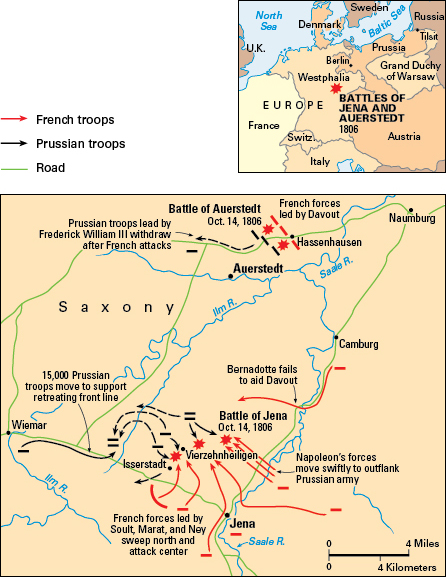Jena << YAY nuh >> and Auerstedt << OW uhr steht >> , Battles of , were fought between the armies of France and the Germanic nation of Prussia during the Napoleonic Wars (1796-1815). The battles took place on Oct. 14, 1806, at the cities of Jena and Auerstedt in Saxony in what is now east-central Germany . Both battles—fought just 11 miles (17 kilometers) apart—ended in decisive French victories. The Prussian army collapsed after the battles, allowing French Emperor Napoleon I to capture Berlin , the Prussian capital. In 1807, Prussian King Frederick William III was forced to accept the harsh terms of the Treaty of Tilsit. Jena is spelled Iéna in French, and Auerstedt is sometimes spelled Auerstädt.

Background.
In 1806, Prussia joined Austria , Russia , Saxony , Sweden , and the United Kingdom in a coalition to try to defeat Napoleon and the French Grande Armée (Great Army). In October, Napoleon advanced into Saxony to engage the Prussian army before it could link up with its Russian allies. The main French force of about 50,000 troops (reinforced to 90,000 later in the day), led by Napoleon, struck about 38,000 Prussians at Jena. At the same time, a smaller force of about 27,000 French troops, led by Marshal Louis Nicholas Davout, engaged a much larger Prussian force—around 63,000 troops—at nearby Auerstedt.
In the days before the battles of Jena and Auerstedt, French troops fought the Prussians in smaller, preliminary battles at nearby Schleiz and Saalfeld. These battles caused disorder and panic among many Prussian troops. The Prussians left a force at Jena to hold off Napoleon while most of the Prussian army withdrew. They planned to regroup at Leipzig , some 45 miles (72 kilometers) to the northwest, but Davout’s troops caught them at Auerstedt.
The combined allied effort against France in 1806 and 1807 is known as the War of the Fourth Coalition. France had defeated the previous three coalitions.
The Battle of Jena.
Early on the foggy morning of October 14, French infantry attacked and overwhelmed the Prussians on the fields near Jena. Within a few hours, the French had driven the Prussians back about 2 miles (3.2 kilometers). The Prussians rallied, making a stand near the villages of Vierzehnheiligen and Isserstadt. Superior French numbers—including a large advantage in cavalry —soon forced this second Prussian line to collapse. About 15,000 additional Prussians arrived in response to messages sent that morning asking for help. They tried to advance through the path of the retreating soldiers, but failed to reverse the retreat. The French victory was won by late afternoon.
The Battle of Auerstedt.
Prior to the French assault at Jena, Napoleon sent Davout (as well as another force under Marshal Jean Bernadotte ) around the Prussians to attack from the north. However, on October 14, Davout ran into the separate—and much larger—withdrawing Prussian force at Auerstedt. Bernadotte, a jealous rival of Davout’s, did not come to his aid. Bernadotte’s failure to provide assistance could have been disastrous for Davout, but Davout quickly organized his defenses at Hassenhausen just northwest of Auerstedt. With fewer than half the Prussian numbers, the French repelled repeated but uncoordinated cavalry and infantry attacks. By midday, both sides had suffered terrible casualties (people killed, wounded, or captured), but French counterattacks forced a Prussian retreat before nightfall.
Aftermath.
The French victories at Jena and Auerstedt cost the Grande Armée about 13,000 casualties. Prussia suffered about 20,000 killed or wounded and another 20,000 captured. The battlefield routs allowed Napoleon to swiftly defeat Prussia, and his troops entered Berlin on October 25. France went on to win the War of the Fourth Coalition, but the victory did not result in a lasting peace.
In 1807, the Treaty of Tilsit forced Prussia to cede territory, including lands that became the Kingdom of Westphalia under the rule of Napoleon’s brother, Jérôme. Prussia remained subject to French rule until Napoleon’s defeat at Leipzig in 1813.
Historians debate whether Bernadotte’s inactivity at Auerstedt was intentional. Napoleon censured (officially condemned) him for it after the battle but later gave Bernadotte further battlefield commands. In 1810, the Swedish Riksdag (parliament) elected Bernadotte the heir to the throne of their childless king, Charles XIII. In 1812, Bernadotte and the Swedes turned against Napoleon. The following year, Bernadotte led Swedish forces in combat against the French. In 1818, Bernadotte—who never learned to speak Swedish—became King Charles XIV John of both Sweden and Norway . His family line rules Sweden to this day. See Royal families (Sweden) .
